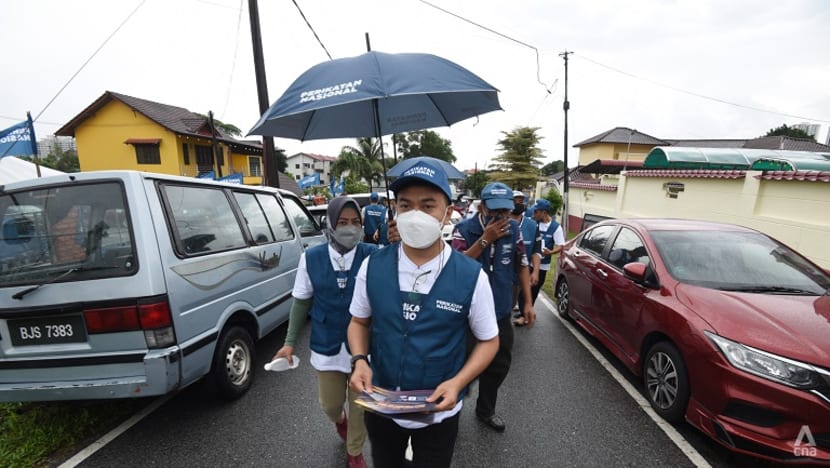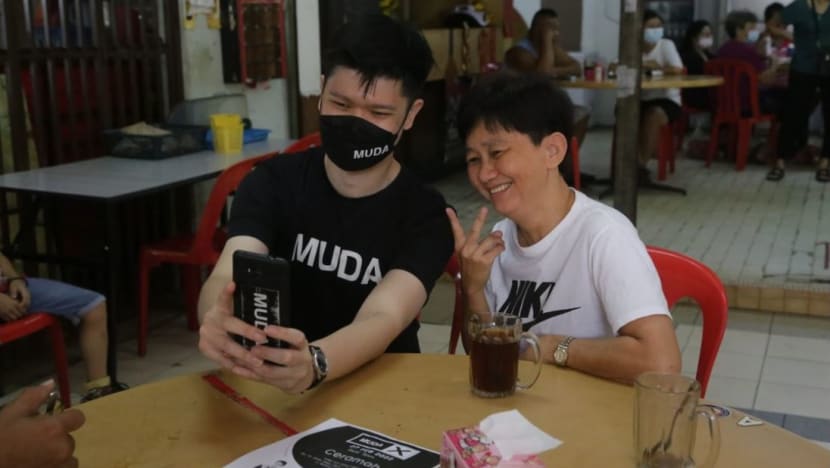Commentary: Johor youths worry over jobs but that may not translate into votes
Everyone is talking up the potential of "Undi18" voters in the upcoming Johor state elections. Dr Serina Rahman examines the youths’ views on the ground and is more cautious of the outcome.

Perikatan Nasional candidate Zulkifli Bujang campaigning in Larkin, Johor. (Photo: CNA/Amir Yusof)
JOHOR BAHRU: The Johor state elections will be an interesting study on which way young voters swing. For the first time ever, youths aged 18 to 21 can vote in Malaysia, hence the popular term "Undi18".
They are a sizeable bloc. Of the about 2.5 million voters eligible to vote in Johor, youths aged 18 to 20 years old make up 6.67 per cent of the electorate, according to the Election Commission of Malaysia.
But it is voters aged 21 to 29 (21.86 per cent of the electorate) who make up the largest group of voters in the state, with those aged 30 to 39 a very close second biggest segment (at 21.59 per cent).
Engaging younger voters is clearly key to a successful election campaign this time round as those under 40 years make up almost half of the electorate.
Automatic voter registration and the influx of youth votes mean that the total number of voters has surged by about 43 per cent compared to the 2018 General Elections.
This percentage is higher in urban areas. Urban Johor has seen an increase in youth voters by 52.5 per cent.
The expectation is that these voters will make a huge difference to the outcome of the election.
THE ECONOMY MAY BE THE TOP ISSUE FOR THE JOHOR STATE ELECTIONS
The economy will be the top issue in this election, if surveys revealing what voters are concerned about are anything to go by.
“I have been trying to get a loan for a house. I will get married next year and I can’t get a loan because of this work. The banks don’t think I am safe enough for a loan,” Ipan Yusri, a former tourism guide told me.
He has received aid disbursements from the government over this pandemic but says that they do not last. He would like to see a long-term solution to his financial problems and for borders to open so that Johor can recover and tourism jobs can return.
Like him, most youths want the economy to recover and find stable jobs to save money and prepare for marriage and family.
In Johor, a key concern has been the availability of jobs with good wages so that citizens would no longer have to commute to Singapore for better-paying work.

Job opportunities, racial and religious divisiveness among the old guard, and the need to have younger representation among the political elite have also been issues raised by youths who eventually joined the Malaysian United Democratic Alliance led by Syed Saddiq.
Many youths have suffered acutely over these past two pandemic years as a result of border closures closing off job opportunities that required a daily commute. Youth who once worked in factories in Singapore or as cleaners have not been able to earn an equivalent salary in Malaysia.
Those in tourism, F&B or services in Johor have also suffered as many small businesses closed down as a result of the pandemic restrictions. While many have turned to the gig economy, they recognise that it is unstable and irregular.
BUT WILL THE YOUTH VOTE?
But are these economic concerns grave enough to prod youths to the ballot box? This is less clear.
Sure, many youths are unhappy with the establishment and disillusioned with politicians from all sides. They saw the bickering at the top while people suffered from COVID-19 and are convinced that politicians are more interested in holding on to power than doing anything to help the people.
They are also displeased that nothing changed or improved under the Pakatan Harapan government after GE14.
But it’s unclear who the establishment is that they should be voting against. In my discussions with rural youth in Johor, many have expressed bewilderment at the number of parties and candidates that are standing in the elections. The average rural villager has no clue who the new parties of Parti Pejuang Tanah Air (Pejuang), MUDA and Parti Warisan are.
They are also unsure whether Parti Pribumi Bersatu Malaysia (Bersatu) is part of Barisan Nasional, nor who makes up Perikatan Nasional. They do not understand why Parti Keadilan Rakyat (PKR) is not running under the Pakatan Harapan coalition.
Confusingly, some of the party flags are in almost the same colour. And most of the politicians in these “new” parties came from UMNO, to begin with.
Many might decide to sit it out. Hakomo bin Bakar, 21, told me that his friends have no intention to vote. “They say there is no point. In the end, it’s the same people who end up in government,” he said.
The youth in this area also lamented that those in power rarely engage with them unless there is something in it for them.
“We organise sporting events for the community, and ask them for support, but they don’t want to help us. Then when we get a good turnout and everyone is there, some political person will turn up and pretend they did all the work and put up a banner.”
“But if anything goes wrong, they blame us. Why should we vote for them?” Din Abd Fikri, 25, complained. “They only talk to each other when they make decisions, they don’t care what we want or think."
They say that they aren’t even bothering to find out more about the candidates or parties because they feel disillusioned with the flagrant double standards.
“We know they are guilty of stealing so much money from the country,” Issudin bin Ali, 23, expressed how he feels frustrated by the court cases involving politicians. “They could break COVID-19 SOPs. And they are still walking freely. But when regular people steal bread because they are hungry and desperate, they go to jail,” he added.
Hakomo added: “The older people just keep repeating how much easier it was to get aid and money from the politicians … and they want to go back to that time.” He says that he did not want to be like that.
“We don’t need politicians. We can still survive.”
MOBILISATION IS THE KEY CHALLENGE FOR PARTIES
Does this snapshot of views from a few rural constituencies represent Johor? Youth in urban areas who are more exposed to broader national issues, have gone through tertiary education or are more engaged with political activists, may feel that they can make a difference by voting for change.
But for the disaffected, often the bottom 40 per cent (B40) communities, for whom it seems like nothing will change for them, the sentiment might be different.
They’re focused on surviving each day rather than what’s in the greater good of the nation. They may not make the effort to vote in the coming elections.
The outcome of Johor’s elections will provide a benchmark from which parties will recalculate and regroup for the next general elections.
While the “Undi18 cohort” is assumed to be the kingmaker for this and any future election, there is clearly a need for better voter education. The vastly changed political landscape with many more new parties and faces will complicate the outcome of the youth vote.
Many contenders in this state election are also new, younger faces. Engagement by these candidates or the youth wings before the general elections might ignite interest among youth voters and turn the tide.
The winning coalition will be the one that focuses on mobilisation and is able to motivate them to come out to vote.
Dr Serina Rahman, Visiting Fellow at the ISEAS-Yusof Ishak Institute, writes from Johor.


















